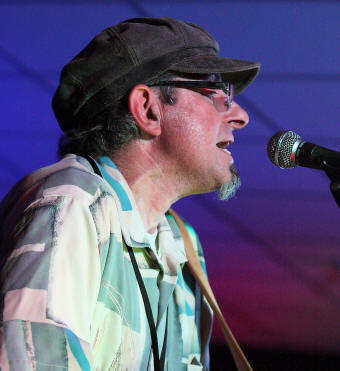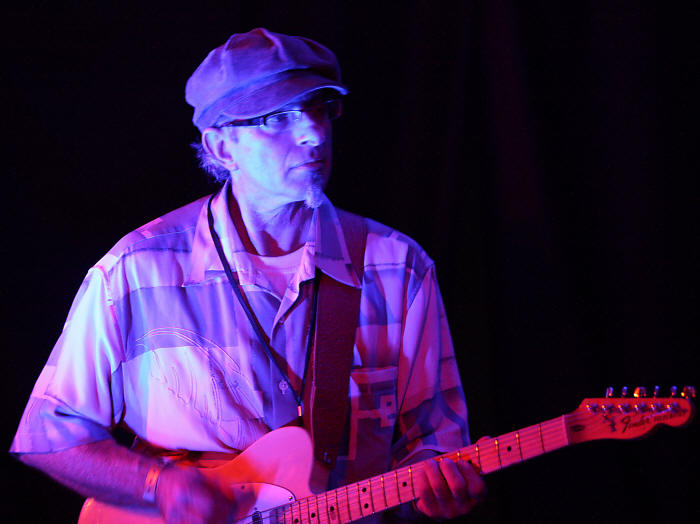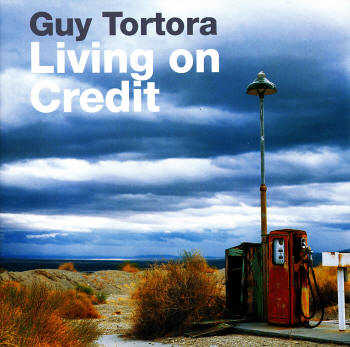|
 Guy, thank you for
sparing the time. Guy, thank you for
sparing the time.
1.
What are your musical memories growing up in Pasadena,
California?
The first music I heard was probably my Mom singing! My parents
listened to classical, opera and swing music, Sinatra and such. My Dad
also liked country music, but my Mom definitely did NOT! My sister, who
was the oldest of us three kids, brought rock and roll into the house:
Elvis, the Everlies, Chick Berry, Jerry Lee. With my older brother it
was Beach Boys, Jan & Dean, weird LP’s with drag racing sounds on them,
and then the Beatles. For me it was the sonic assault of the 60’s: the
folk revival, Dylan, the Stones, psychedelic bands, garage bands like
The Seeds, or ? and the Mysterians, L A Bands such as Buffalo
Springfield, and also blues, soul, gospel. I devoured it all.
2.
Did you always want to become a musician?
Me and everybody else I knew in high school. We were obsessed.
3.
How did you get started in music?
I started out on the violin as a kid, but gave it up as “uncool”
once I’d touched my first guitar,
which my brother brought into the house.
4. What
kind of material were you playing in the early days?
At first it was folk stuff on acoustic, Pete Seeger, Dylan, that
kind of thing. When I got to junior high and high school I was playing
in bands at school dances where we played anything that was popular on
the radio, rock and roll, surf music, Stones, Beatles, Motown, anything
you could dance to.
5. ‘Roots,
Americana and Blues’ – does this sum up what you do?
Pretty much, with a splash of folk and jazz thrown in for good
measure!
6. Who
are your favourite blues artists (both old and new)?
Where to start – where to finish? Old: The Kings: both B B and
Freddie, Muddy Waters, John Lee Hooker, Skip James, Memphis Minnie,
Howling Wolf, Junior Wells. New: Taj Mahal, Eric Bibb, Bonnie Raitt,
Keb Mo, Shemekia Copeland. Mostly I like the “rootsy” sound.
7. Who
has influenced you the most in your music writing and playing?
For writing it has to be the classic singer/songwriters like
Dylan, Joni Mitchell, Neil Young, but also the traditional songs that
have no established author. For playing acoustic guitar maybe Skip
James or Davey Graham. For electric perhaps Steve Cropper – I don’t see
myself as the flashy long solo kind of player – I also like what BB King
and Jimmy Vaughan do. I play mostly with my fingers, not with a
plectrum.
8. What
first attracted you to the blues?
The emotional range of the music: that it could be so profound
and yet seemingly so simple, and it was made to make you move.

9. What
was the best blues album you ever bought?
There’s no one album of any kind I’d dare call the best, but B B
King’s “Live at the Regal” would be up there somewhere.
10.
What is your
favourite instrument?
It has to be the human voice: infinitely expressive in all its
forms.
11. Are there any
particular songs that you play that have special meaning to you?
Every song I do has to have some meaning for me or I can’t put
it across. Of my own songs, “Mama’s Tired” and “Good Morning Mrs. T”
are about my parents, “Like It That Way” and “Soulmate” are about long
time relationships. “Cotton Was King” has a lot of meaning for me and
audiences really connect with it, too.
12. What
brought you to the UK?
I originally came to Europe with an American girlfriend who
wanted to travel – I wanted to be with her. After we split up I met my
wife, who’s British, so I guess you could say it was love on both
counts.
13. Who
impressed you musically the most when you first came to the UK?
I first came in the seventies, there was a lot going on then.
Among those who made an initial, and lasting, impression were John
Martyn, and also Richard Thompson: what a great songwriter and unique
guitarist!
14. How healthy do you
think the blues scene is in the UK compared with the US?
The scene in the USA is bigger and more integrated into the
culture and so more robust. Even so many venues are struggling these
days, and even more so in the UK right now. But there are new clubs
starting up, too, which is hopeful.
15. Tell me about the band,
when did you get together?
This particular band has been going for about six years, but
over the last two years or so the rhythm section has been in constant
flux. I’m hoping it will settle down some this year. My keyboard
player Janos Bajtala is now the band member who’s been with me the
longest.
16. Tell
me about the making of your new album ‘Living on Credit’?
This album was recorded at a great little studio near where I
live in London called The Cowshed. They have a fantastic set up of
vintage and modern gear, valve pre-amps, old mics, and such. We
recorded the basic tracks on 2” tape, and then transferred everything to
the digital platform for editing and mixing. It gave the album a great
“Old School” sound without costing me a huge fortune. My engineer and
co-producer Tim Burns must also get a lot of credit for his input and
getting everything sounding right.
17. A
lot of music styles are fads but the blues is always with us. Why do you
think that is?
So much of the foundation of modern popular music is based on
blues and gospel: the building blocks – the basic DNA, if you will --
of pop music mostly come from there. So much so that people hardly
notice it sometimes. It has great emotional depth that speaks to
everyone.
18. How
do you see the future of blues music?
That’s very hard to predict. Every form of music has its moment
– its prime time of innovation – and then things move on. The audience
for blues music is aging and without more young players and fans there
is a danger that the blues will end up in some kind of museum, a musical
cul de sac. But talented players can always bring something fresh to
the table.
19. What
are your future plans / gigs / tours / albums?
I don’t plan overmuch. I make albums as and when I can afford
to, so every album sold brings the next one a little closer. I tour as
and when it can be done. I’m always looking to do more and do it
better.
Thank you
so much Guy, I really appreciate your time.

Living on Credit
was released in February 2008, and this latest album brings a slight
change of style, aided by the hard hitting harp playing of Giles King on
the title track and also on Cotton Was King, a song that's
begging to be run over the closing credits of a movie that hasn't been
made yet. The lyrical Like It That Way and the slow swing of
White Boy Blues boast the superb playing of Guy Tortora Band
keysman Janos Bajtala. Covers of songs from the likes of Blind Willie
Johnson to J J Cale, Curtis Mayfield and Rick Estrin round out a set
containing the musical contributions also of talented drummers Mike
Thorne and Mark Fletcher, Richard Studholme on mandolin, and bv's by the
UK Family Jewels: Frankie & Bex.
The album "Living on Credit" is on Turtledove Records and
can be purchased from Proper Distribution:
http://www.properdistribution.com/search/search.php?pg=8&searchfor=Turtledove+Records&searchfield=label
or by accessing Guy's website:
www.guytortora.com
www.myspace.com/guytortoraband
or by download - try
putting "guy tortora downloads" into the search engine at your favourite
site.
Artwork used with permission.
Return to
Blues Interviews List
Website, Photos & Text © Copyright 2001-2009 Alan
White. All Rights Reserved.
For further information please email:
alan.white@earlyblues.com
|









 Guy, thank you for
sparing the time.
Guy, thank you for
sparing the time. 
